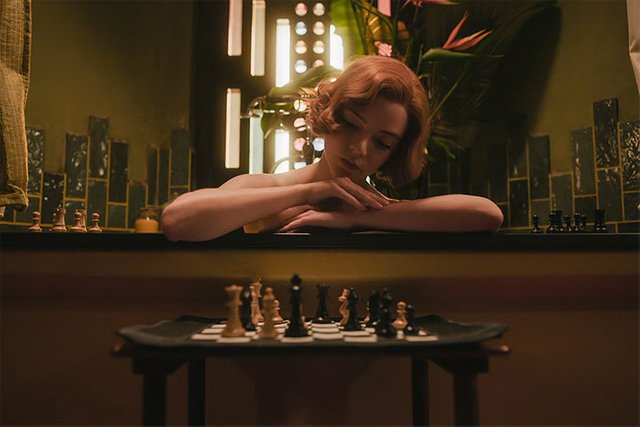Queen's Gambit (A review of Netflix show)
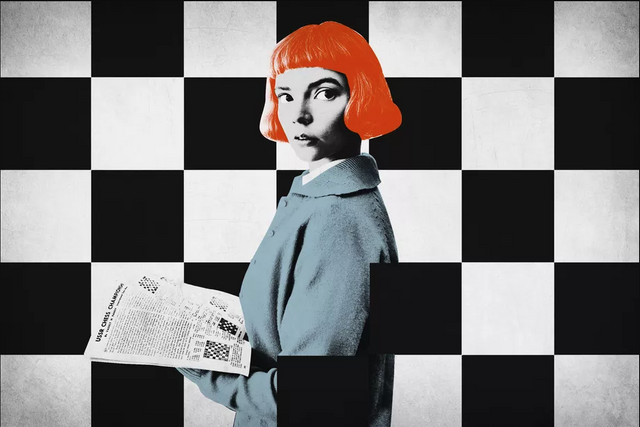
In short, Queen's Gambit is a show about a girl prodigy (Elizabeth Harmon or Beth, as she preferred to call herself), who,
despite difficult life circumstances, and contrary to, so to speak, the power of the patriarchy in chess, nevertheless becomes the world champion. In the final, which took place in Moscow in the sixties, she defeats the Soviet champion. That champion has a fictional surname Borgov, and he is somewhat similar to Arnold Schwarzenegger. Apparently, this is a variation on the surname Botvinnik who was the actual big name in chess at that time.
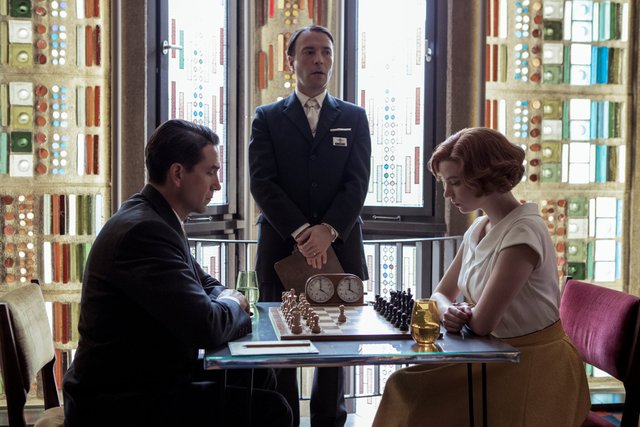
The actual Botwinnik looked like this.

However, the discussed events being so remote in time, that it’s no wonder that many people nowadays might think that this incident has happened. In the same way, for example, most people today base their knowledge of Cardinal Richelieu, Duke of Buckingham, and Luis the Thirteen from the story of Three Musketeers.
The show has several references in support of the progressive agenda that is so prevalent in the Hollywood paradigm in this day of age. For example, her only girlfriend in the orphanage was a foul-mouthed black girl. Later in the show, this girl will play a crucial role in Beth's life, pulling her by the hair from alcohol addiction, and landing her three thousand dollars to travel to Moscow, while the American Chess Federation refused her in this favor.
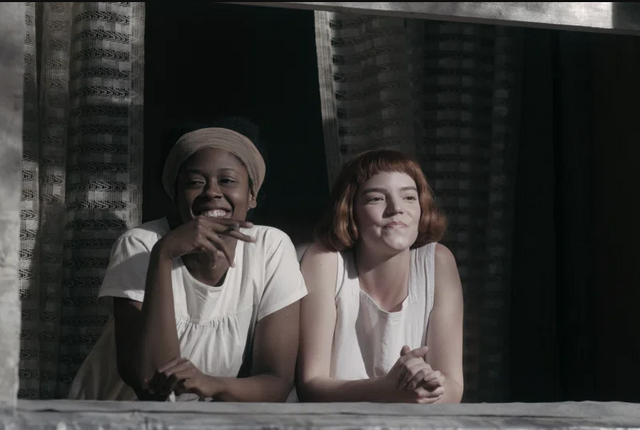
The previous American champion named Benny Watts explained to Harmon that the Soviet players always won because they work collectively, as well as they were supported by the Soviet state, while in the United States, each player represents only himself, and the state does not care about him.
At the crescendo moment of the match with the Soviet champion, with the adjourned game, a group of American chess players called Elizabeth at her Moscow hotel room, and by collectively discussing the match and identifying Borgov's possible moves, they ultimately help Beth to win. The movie creators’ Intentions here were to make a viewer contemplate that if America would have had a socialistic government, then America would topple the Soviets in chess as well as in any other aspects of human activities.
To be fair, his position has some merits. Talented athletes in the Soviet Union indeed were supported by the government, especially during the years of the Cold War. Since sports were just about the only opportunity for the Soviet people to break through the Steel Curtain, winning in sports competitions had political importance as the wins demonstrated to the Soviet people the advantage the Soviet system over the decayed capitalistic West.
Conversely, in America, where people accustomed to watching professional sports, the Olympic Games weren’t such a big thing and only the most accomplished athletes received advertising short time contracts with some shoe or clothes companies.
All this is a precursor, because, firstly, there are only a few of these progressive references scattered in the show, they are firmly embedded in the narrative, and do not arouse a gag reflex with inflated tendentiousness.
Secondly, the script is well written, filled with interesting and well-selected characters, and it was a pleasure to watch overall.
By the way, I do not claim objectivity, and when I write "The casting for the movie was perfect," one needs to automatically prefix this statement with a phrase "from my point of view."
Having said this … the actress was so well suited to the role that I can't imagine her in any other one.
She’s extraordinary charming. I use the word "extraordinary" not as quantitative characteristics, but in the sense of "unusual" or "uncommon." That is, she has not just a female charm, although she has that as well, but rather a charm of a personality.
This girl has a strange form of nose and lips, disproportionately large eyes, and she does not fit well into the category of "pretty" girl. But her face is so interesting that all things considered, I couldn’t tear my eyes from her, while the show lasted.
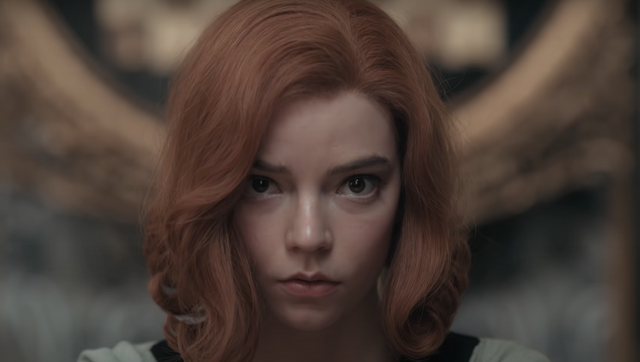
One of the episodes describes her confrontation with a group composed of such pretty sexually mature girls, with clean facial features, and faces unspoiled by the intellect. At first, they tried to ostracize Beth, boycott her, collective ridicule her and even assault her physically, with supposedly random pushes and shoves. To them, she seemed too smart for her own good. After all, she knew what a “polynomial” was.
But, they picked on the wrong girl. The constant mental struggle was so much Beth's element that all these animosity attempts were child play for her. Once she defiantly taran rammed through the entire group of all these girls without saying a word. After that, she was no longer bullied.
The child actress who played Beth at the age of nine also did a great job. It is at this age that Beth's character manifests itself openly. In fact, her character is simple and wholesome. She acts according to her feeling, striving to achieve her desires. Only her desires were radically different from those of girls her age. She was bored in class classes, choir singing, and other little girly activities. She was fascinated by the complexity of chess and the intellectual struggle captivated her.
A very indicative moment of her interest shows how after being presented a doll, which was supposedly appropriate to her age, she dumped it into a trash can as soon as she was out of sight.
The show has a wonderful scene when Beth goes down to the basement of an orphanage and plays chess with a school’s custodian - her first chess mentor, Mr. Shaibel. She loses one of her first games and when she made one of the inexperienced moves, the gloomy Mr. Shaibel knocked down her king, stating that the game was over.
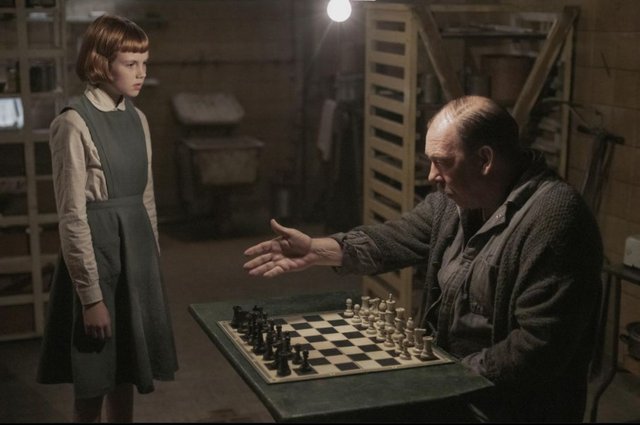
When the girl protested, demanding to bring the game to the end, he sent her back to the class. Then she called him “kocksucker”, the swearing word she heard from the older girl but the meaning of which at that point, she didn’t understand.
Later in life internally the same intense and fouled mouthed girl, except she is usually in control of her emotions. Later in the show, the journalist from Times magazine asked Beth, who was an orphaned, whether she perceived the chess king and queen as her father and mother. Knowing Beth, I think she swore at the journalist inside for that conniving intrusion in her personal life. Verbally she replied, "they are just pieces."
Subsequently, playing against different opponents, she often scolded them, but only in her mind. Her eyes, however, betrayed her attitude with a non-burning view of the intellectual python, aimed directly at her opponent.

In general, throughout the show, the difficulties she had to face in her life, and her stoic attitude towards them, are very touching.
A couple of scenes are especially memorable. In one of them, Beth’s crazy mom confronts her biological dad, who has another family. After the scandal, Beth asks her mother
“Who was that?” to which her mother responds “A mistake.”
In another scene, when Beth is brought to an orphanage, a black girl asks her what the last words of her parents were. To which Beth replies "I don't remember," even though she perfectly remembered how her mother said, "close your eyes" before crashing her car into the oncoming vehicle.
The moment when Beth was on her way to Mr. Shaibel's funeral was also remarkable. For the first time at her conscious age, she cried after telling a friend that she had not given him back ten dollars, which he lent her to take part in her first tournament.
Naturally, this had nothing to do with ten dollars. Before that, Beth went down to the basement of the orphanage and saw that all the walls of Mr. Shaibel's place were covered with clippings from newspapers dedicated to Beth's victories. That is, for this cleaner she was the pride and joy of his life. So the idea of not expressing him her gratitude, and a realization of the inability to do so anymore, made her cry.
Beth is in no way shown by this "goody to shoe" girl. When she needed something - she easily steps over the permitted norms.
For example, in a scene with the theft of tranquilizers. In an orphanage, (it happened in the early 60s) until sometime, children were given tranquilizers. Apparently, it was believed that this is how children behave calmer and sleep better.
Tranquilizers had an amazing effect on Beth. She began to see a chessboard and moving figures on the ceiling, thus learning to play games in her mind.
However, after the state passed the law prohibiting the use of tranquilizers to children, Beth was denied their use. Then, while the entire orphanage was preoccupied with watching the movie, Beth without much conscientious hesitation, used a screwdriver to penetrate the section, where there was a large can with these tablets.
I have to explain that Beth wasn’t a compulsive thief that experienced an adrenaline rush while performing an illegal activity. She just thought tranquilizers helped her to conceptualize games, and removing her access to them was ill warranted.
In another episode, when her adopted mother sent Beth to the pharmacy, she noticed “Chess Today” magazine and began reading it. The owner of the store forbad her doing so, stating that she can read only after the purchase. Then Beth bought a cheap newspaper, waited until the seller's attention was occupied by another customer, wrapped the magazine in the newspaper, and took it out of the store. Knowing her character, she probably swore at him internally. Should he let her read the magazine in the store, she wouldn't have to steal it.
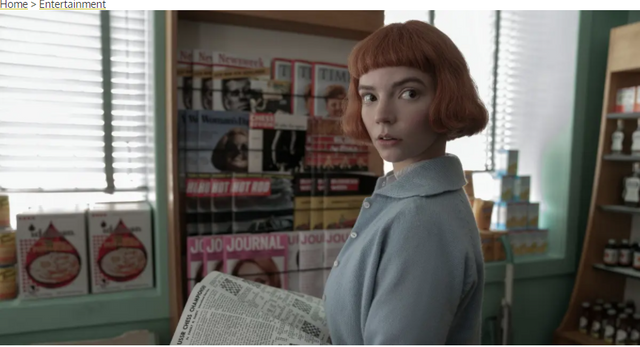
A few years later, having already earned a lot of money in tournaments, she again went to this store and have bought something, said to the salesman "Keep the change." Thus she covered his loss of the stolen magazine.
Beth apparently inherited a proclivity to alcohol addiction. This was also helped by the fact that her adoptive mother also abused. From this abuse, this woman died from liver disease.
Having lost the match to the Soviet grandmaster in Paris, Beth returned to her Kentucky house with severe depression due to the defeat, and without any moral support from family and friends, sank to heavy drinking, and almost followed her adoptive mother if it were not for the arrival of her black orphanage friend and the death of Mr. Shaibel that have shaken her out of that spree.
It was curious to observe her attitude toward sex, the manifestation of which she curiously watched around her since her arrival to the orphanage. Once, being already in her late teen years, she decided to try it, and at a party where she got drunk and smoked marijuana, she had her first sexual experience. Yet this experience did not excite her at all. She even asked the boy who was on top of her, "How long will this last?"
Then, when she lived with chess player Ben Watson, who prepared her for the championship, she had sex with him and for the first time received satisfaction from it. "Ah... that's how it supposed to feel."
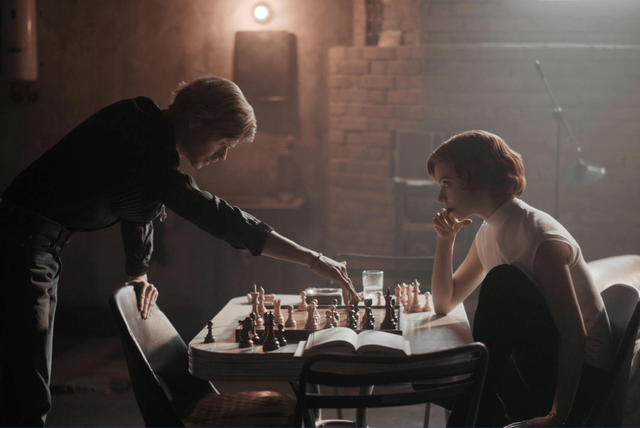
In Paris, before the match with Borgov, instead of sleeping at night, she spent it with a French fashion model. The sexual scene was not shown, but when Beth ran away to the game, the Frenchwoman was still in her bed. I doubt it was shown by accident.
All things considered, I enjoyed the show greatly. Whether you'd like it, I don’t know. It is up to you.
